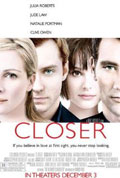
Directed by
Mike Nichols
98 minutes
Rated MA
Reviewed by
Bernard Hemingway

Closer
It’s a bit of stretch to accept this neither fish-nor-fowl four-hander as an “honest look at modern relationships” as the promotional spuiking has it but impossible to swallow the outrageous claim that it is realistic. For a start there’s the trans-Atlantic marquee casting of Julia Roberts, Natalie Portman, Jude Law and Clive Owen as the far from plausible characters of the story, then there’s the even less likely set of contrivances required to bring them together and start exchanging bodily fluids.
It comes as little surprise to find out that the script by Patrick Marber was based on his 1997 play of the same name. On stage characters and actors playing them serve to articulate the playwrights’ ideas and words and these carry the day, or not. But in cinema the gap between illusion and reality is far smaller. With Closer we seem to have much of the play intact but puffed up in an expensive but ill-fitting filmic suit. This incongruity is not helped by the fact that events take place over a four year period and Nichols simply leaves out huge chunks of time, expecting us to account for how his characters have changed in the intervening period (although the hardest shift to swallow comes in the final chapter after Dan confronts Larry and seems to happen very quickly).
The story concerns Dan (Jude Law),a frustrated novelist who writes obituaries (of course) for a London newspaper. He meets Alice (Natalie Portman) a beautiful (of course) stranger when she is knocked down by a taxi. Scroll forward in time and he’s written a novel, and (of course) photographer, Anna (Julia Roberts) is making him over for its dust-jacket. They fall for each other but Alice manages to scare Anna off. Dan however, surfs sex sites on the internet pretending to be a woman and there he meets Larry (Clive Owen), a dermatologist (of course). This leads Larry to Anna but Dan still wants her. And so it goes as the four variously re-configure in permutations of more or less emotional, physical and spiritual dissatisfaction.
Nichols best known films, The Graduate, 1967, and particularly Carnal Knowledge, 1971, dealt, as this film does, with the simultaneously creative and destructive power of the sex drive and the way our rational mind deals or fails to deal with it as we lie, cheat and betray ourselves and each other in trying to cope with it. But those films had a narrative and dramatic integrity that this one does not. Although there are some interesting ideas here and there is perhaps in it some reflection of the Zeitgeist of the new millennium, this is in the text not the film. Indeed one spends most of the time slack-jawed at the kinds of things both large and small we are meant to accept as plausible behaviour (ranging from Dan taking an injured girl to hospital and not finding out her name, to Anna taking up with a guy who trawls cyberspace looking for free sex). .
Closer is too dyspeptic in its view of human relationships to serve as mainstream entertainment, too glib in its realization to serve as real-life drama. Notwithstanding, it would seem that because it deals with sex in a fairly frank way (and this includes putting the obliging Portman in a G-string and Roberts, in the guise of her character of course, confessing her hardcore sexual preferences in a way that wopuld keep Kevin Smith very happy) critics have willed the film a level of quality that it simply does not have (Portman and Owen were both nominated for Best Supporting Oscars but, mercifully, did not win). If you can't run with its the characters, ideas are simply not enough to carry a film.
Want something different?





